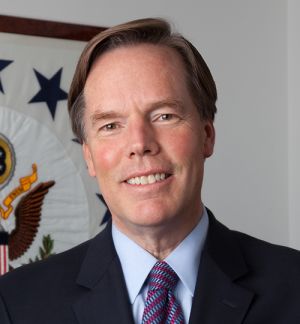The presidency of Donald Trump is challenging nothing less than the foundation of American democracy, says R. Nicholas Burns, a former U.S. ambassador and undersecretary of state for President George W. Bush.
“That generation between 1945 and the last couple years produced, despite all the problems we have, a stable world,” said Burns, seated in a cowhide chair in the lobby of La Posada de Santa Fe. “And I am now worried.”
Burns was in town as keynote speaker for the nonpartisan, nonprofit Santa Fe Council on International Relations’ annual gala on Friday night. The group over the past half-century has brought more than 300 guests to New Mexico to discuss world affairs.
Sandy Campbell, executive director, said, “For us, right now, we feel it is crucially important for us to bring in speakers who have a breadth of experience, who can rise in many ways above the partisan politics in this country right now and offer a fair and balanced and intelligent take on the world.”
Hours before his talk, Burns said he was poised to present a warning.
“We have a crisis of leadership in Washington and in the White House,” he said. “President Trump is pulling us back as a global leader. ‘American First’ — 10 months into his administration — it is pretty clear what he means by it.”
What Burns described as the president’s bullying, aggressive posturing and nationalist policies are creating a form of isolationism that amounts to digging a moat and pulling up the drawbridges, he said. Or in this case, building high walls — both physical and political — against allies such as Mexico and Germany. And as a result, he said, trust among allies is eroding rapidly, at levels that may be difficult to repair.
When the Twin Towers fell in New York on Sept. 11, 2001, Burns was the U.S. representative to the North Atlantic Treaty Organization. That evening, his phone rang as ambassadors for European allies and Canada pledged their support for the United States in whatever war might come, before an enemy had even been identified.
“That is an extraordinary commitment,” Burns said.
But under Trump, he said, the U.S. has retreated from global climate agreements, trade deals, immigration policy and international coalitions for peace.
“That is going to affect whether people believe in us, whether they are willing to work with us, whether they believe in American leadership,” he said. “We are already seeing an impact.”
This is not the world Burns envisioned three decades ago. When the Soviet Union was on the brink of collapse, Burns took notes from the end of a table shared by President George H.W. Bush and Mikhail Gorbachev, then the Soviet general secretary, as the two men negotiated what would lead to the end of the Cold War, without a nuclear detonation.
“Democracy spread in Europe and Asia,” he said. “We began to see dramatic rises in income and prosperity around the world, because America was engaged.”
Burns, who spent the ’80s in diplomatic postings in Africa, Egypt and Israel, would go on to serve Bush and then President Bill Clinton as an adviser on Russia with the National Security Council before becoming a spokesman for Clinton’s State Department, and then U.S. Ambassador to Greece. His final appointment was as U.S. representative to NATO, from which he stepped down in 2008 amid a slew of diplomatic resignations that year. At the time, The Washington Post called him a high-profile and influential civil servant, despite casting “an optimistic gloss on U.S. diplomacy.”
In the last decade, Burns, now a professor at the Harvard Kennedy School, resumed a political activism that began in his youth campaigning for Sen. George McGovern for president in 1972, by supporting President Barack Obama’s candidacy. He also worked as a foreign policy adviser for Secretary of State Hillary Clinton during the 2016 presidential election. She is a person, he said, “I deeply believe in.”
And since November, Burns has been vocal about the impact of a Trump presidency, in op-ed newspaper pieces, interviews and twice testifying before Congress this year about Russian interference in last year’s election and efforts to slash the State Department budget.
Trump’s efforts to dismantle foreign policy, Burns said, are echoed with equal hostility on American soil, by working to degrade, de-fund and dismantle government organizations and undermine news media.
The press, he said, “is part of our democratic system. Our system didn’t work if you didn’t have an independent, objective group of people questioning those in power. To deconstruct government, to weaken it to the point where it cannot function, that is destructive to a civil society.”
With midterm elections coming in 2018 and the next presidential election in 2020, Americans must get involved in the political process, Burns said.
“Those of us who have strong opinions need to stand up,” he said, “and voice them.”
Contact Rebecca Moss at 505-986-3011 or rmoss@sfnewmexican.com.





